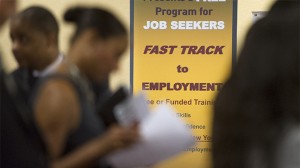A few days after Christmas, 1.3 million Americans who have been out of work for a significant period of time will see their unemployment benefits disappear. Democrats had pushed for a renewal of the extended unemployment benefits that have been available since shortly after the crash, but as Rep. Tom Cole (R-OK) put it, “the Republican position all along has been, ‘we need to go back to normal here at some point’.”
Unfortunately, the labor market isn’t back to normal. There are almost three Americans looking for work for every full-time position that’s available, a ratio that’s tougher than it was during the worst days of the 2000 recession, according to the Economic Policy Institute.
As Evan Soltas points out in an article for Bloomberg News, North Carolina offers us a glimpse of the struggle that the long-term unemployed will face nationwide…
The federal extension of unemployment insurance expires on Jan. 1. To see the consequences, look at North Carolina.
I’ve been watching the state since July, when it cut the maximum length of benefit from 99 weeks to just 19, and reduced the weekly check from $535 to $350.
Across the country, the unemployed will lose from 14 to 47 weeks of insurance when the extension ends. Five other states will join North Carolina in providing fewer than 26 weeks of payments — the standard in the US until this year. What’s happened in North Carolina since July is an indication of what will happen nationwide. The picture is troubling.
As intended, presumably, the number of North Carolinians receiving unemployment benefits has collapsed. It’s down by 45,000, or 40 percent, since last year. Expiring benefits aren’t the only reason for this. Far fewer are filing a claim in the first place. Initial claims are running at about half last year’s rate. Unemployment insurance is a thinner safety net than it has been in decades.
In addition, North Carolina’s labor force began to shrink. The state is experiencing the largest labor-force contraction it’s ever seen — 77,000 fewer people were working or searching for work this October than a year ago. This should, but won’t, settle a partisan debate. Cutting unemployment insurance apparently hasn’t encouraged the unemployed to look harder for work: It has caused them to drop out of the labor force altogether.
To see what the “safety net for the safety net” is in the Tar Heel State, read Soltas’ entire report at Bloomberg.


